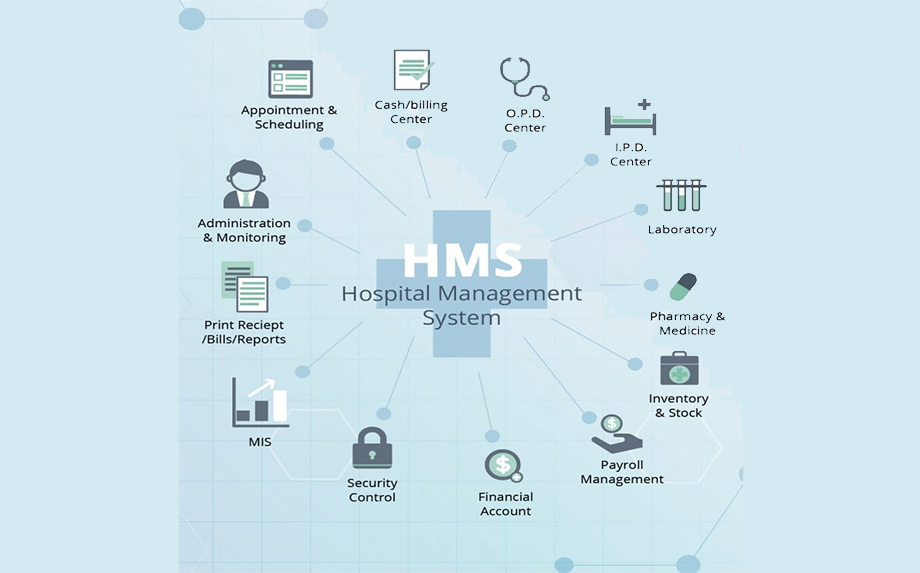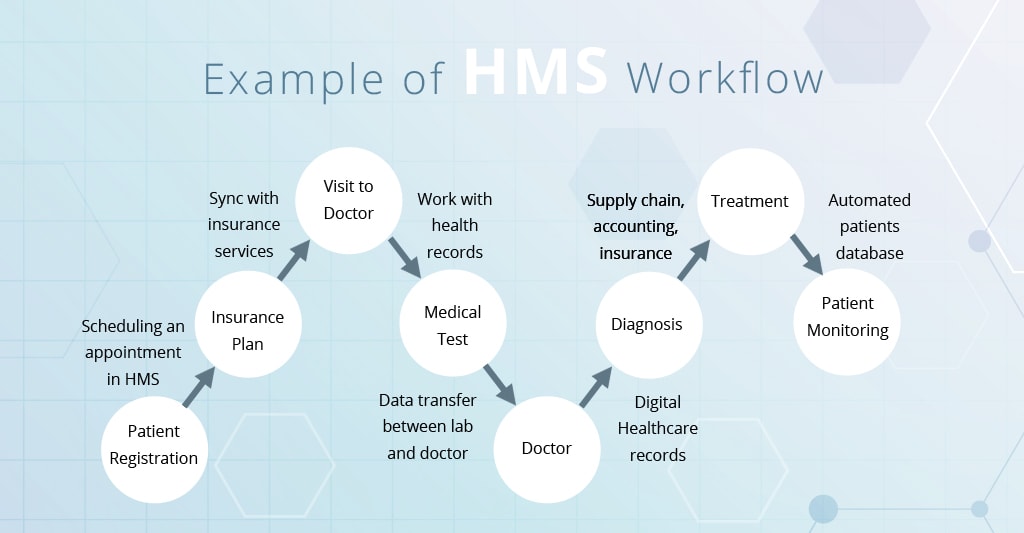
The Hospital Management System [Rex-HMS] is an integrated software that handles different directions of clinic workflows. It manages the smooth healthcare performance along with administrative, medical, legal and financial control. That is a cornerstone for the successful operation of the healthcare facility.
As long as each stage implementation needs to be accurate and explicit, the clinic management system provides certain automation of many vital daily processes. The hospital system software covers the services that unify and simplify the work of healthcare professionals as well as their interactions with patients.
There is always the wide choice of features that can be included in the system. Moreover, the most important thing they are created to streamline various procedures that meet the needs of all the users. The hospital management system feature list is concentrated on providing the smooth experience of patients, staff and hospital authorities. It might seem that their expectations differ, they still are covered by components of the hospital information system. Quality and security still remain the main criteria of the medical industry.
It is also known for the constant and rapid changes to improve the efficiency of medical services and satisfaction of the patients.
Hospital management has greatly changed over the last decades. Business expertise, modern technologies, connected devices, mobile apps, and knowledge of healthcare are key elements for the implementation of hospital management system project. The number of healthcare providers has increased and the patients have a wide choice of medical specialists. The interactions between the hospital and the patient can be simplified for the convenience of both sides. Each institution has the opportunity to create the efficient, clear and fast delivering healthcare model.
Depending on the hospital management system software features, it can deal with a lot of tasks. It helps to outline and implement policies, guarantee communication and coordination between employees, automate routine tasks, design the patient-oriented workflows, advertise services, manage human and financial resources and provide the uninterrupted supply chain. The components of a hospital information system can be chosen and combined in the general system that meets the needs and norms of the healthcare industry as well as quality standards. One of the main requirements of the clinic management system is security. All medical records have to be protected and only accessible for the allowed users. The convenient and informative interfaces should correspond to their roles and responsibilities in order to protect the confidential data.
Since the purpose of the hospital information system is the arrangement of necessary, precise and appropriate data, the hospitals should ensure the system work and can be accessed at any time. The online hospital management system and desktop (on-premise) solutions are possible options of the healthcare providers. This could be a unique system for the certain institution, chain of clinics, state hospitals or even the international medical organizations. It is usually started with the basic version that can be scaled up.
The implementation of hospital management system project provides the institution with different advantages that improve the service quality and efficiency. As mentioned above it is created for three groups of users: patients, hospital staff and management, and third-parties like drug suppliers and insurance companies. The interaction between them conveys the general performance. The benefits received by a certain group of users also positively influence the work of the others. Cooperation and communication are the fundamental requirements here.
In order to create the hospital management system feature list, you need to identify your priorities by choosing the benefits that are prior for your case.
Automation is one of the main benefits here. It helps to optimize the user experience. Medical specialists, patients, and hospital authorities can interact online, make the appointments and exchange information.
The hospital database includes all the necessary patient data. The disease history, test results, prescribed treatment can be accessed by doctors without much delay in order to make an accurate diagnosis and monitor the patient’s health. It enables lower risks of mistakes.
It is vital to engage all of your employees for improved coordination and teamwork. They do not need to make special requests and wait for a long time for an answer. Each specialist will be in charge of certain process stage and can share outcomes with colleagues just in one click.
Hospitals authorities are able to manage their available resources, analyze staff work, reduce the equipment downtime, optimize the supply chain, etc. Another fact to mention is that hospital staff deal with the digital data instead of endless paperwork.
The management has the ability to monitor different financial operations including expenses, profits, and losses, paying bills and taxes, in and outpatient billing. The financial awareness helps to analyze business prospects quite clear and move in the right direction.
Due to the high market competitive nature, the medical industry is also open to all the different innovations that enable communication between patients, doctors, suppliers, and marketing services providers.
Integration with health insurance services improves the experience of the patients and brings benefits to the institution. It allows you to be innovative and helps both the patient and hospital to handle many aspects of the insurance process successfully.
As the services and interactions are improved in all possible ways, everything is being planned with greater precision. It saves the time of all the system users and provides them with up-to-date information.
Patients have their own system accounts where the list of various actions can be performed. They are able to make online requests or reservation, receive the test results, receive the consultation of the medical specialists and many more.
Since the clinic management system is patient-oriented, the treatment process can be less stressful. Doctors have more time for the examination and interaction with patients. In addition, all the requested information can be received online.
The hospital management system automates the clinic’s work and optimizes the utilization of resources instead of only the storage and presentation of the information. It balances the occupancy rates and calculates the number of required employees. Automation helps to manage the general process, deals with the different healthcare services and equipment providers on its own, analyzes and sends notifications to the user. The purpose of the hospital information system is managing the employee and patient activities remotely with immediate access for the authorized users. The patient-centric and well-managed company will also ensure a better work environment for their employees.
When the patient wants to have an appointment, he might choose among a few options. Firstly, you can find the data about visiting hours on the medical specialists’ profiles and book a convenient time. Secondly, you simply dial the receptionist who will check the doctors’ schedule for you and set your appointment. In both cases, the doctor gets the information about the next visit whereas the patient will get a reminder via SMS, email or even receive the automated calls.
As for the medical specialists, the healthcare record management system that contains the patient information in one place enables more efficient work of the staff. Automation speeds up the process of patient registration and filling out all the necessary records. The doctors have the ability to check the disease history, test results, as well as add new data to the patient file. The job of the doctor that previously involved too much paperwork can be completely computerized. Doctors spend more time on patients’ treatment rather than documentation. If something is requested in a written form, they are able to print it.
Finally, the clinic authorities receive the automated control of all the interactions in their facility. The hospital system software can generate the analysis of staff work, financial expenses, revenue, set the general priorities of the institution, outline future directions.
